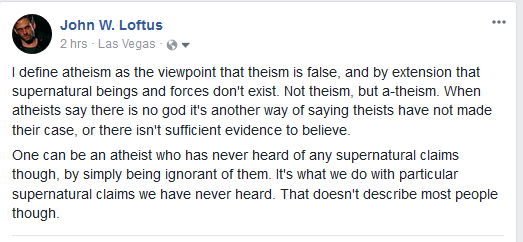I was asked to define faith. So I said: It's accepting an extraordinary claim as true, such as a virgin having birthed an incarnate son of God, without sufficient objective publicly verifiable evidence, or even the need for sufficient objective publicly verifiable evidence.
Then I was asked what I mean by objective evidence. So I said:
That's your problem. You don't know what evidence looks like. That's a main point of mine. Just imagine what would convince you of such a claim in today's world. THAT!
Or just imagine what it would take for you to believe the same claim coming from an ancient Chinese religion. THAT!
Your brain is hard wired to believe. You must train it against its evolved tendencies to require hard evidence when someone, anyone, claims a virgin gave birth to an incarnate god, especially in the ancient world. There is an abundance of psychological evidence showing this. In other words. your brain is not functioning properly when it comes to truth. We know this. And we know the solution too!
Less than a mile from my house, the construction of a church is taking place. This new house for a god, a rather modest structure, stands in front of a much larger church and across the street from an even bigger church. Three buildings designed with one thing in mind, to provide a venue where Christians can fellowship with one another. Three conflicting interpretations of god’s will for humanity, making it apparently impossible for the members of these churches to congregate under one roof together. Yet, all claim to offer guidance to those who seek a spiritual life. The resources dumped into these three structures alone could have fed and sheltered many of our homeless in a city of churches that has far too many poor people. Yes, the town where I live is often referred to as the city of churches. There’s always room for another church it would seem.
So far, we have looked at three arguments against the existence of free will, each one based on a different type of determinism. But there is another reason for denying freedom of the will: the concept itself appears to make no sense. In this fourth and final part, I explain why.
I can remember it like it was yesterday, my father debating with a Christian from another sect about what it means to be a follower of Christ.
He loved challenging believers from other churches, largely because he didn’t think they were real Christians. Most were far to “worldly’ to qualify in his opinion. This time, the point being made was about trusting in a god. So, he dared them to go home, get out their insurance policy, hold it up to the heavens and then say, “God, I trust you.”
Let me begin by saying that I’ve never heard the voice of any god, demon or angel.
Never! Trust me, I’ve never even gotten a phone call from one. I’m just as relieved to tell the you the truth, because if I ever did hear the voice of a god, any god, I’d shit my britches. On the one hand, it would be the most earth shattering conversation I’ve ever had, assuming that god would let me ask a few questions. But even if I’m rendered speechless from wonder, I can tell you that my life would never be the same again. And, if I actually got to see god, I probably wouldn't be able to recover from the experience.









